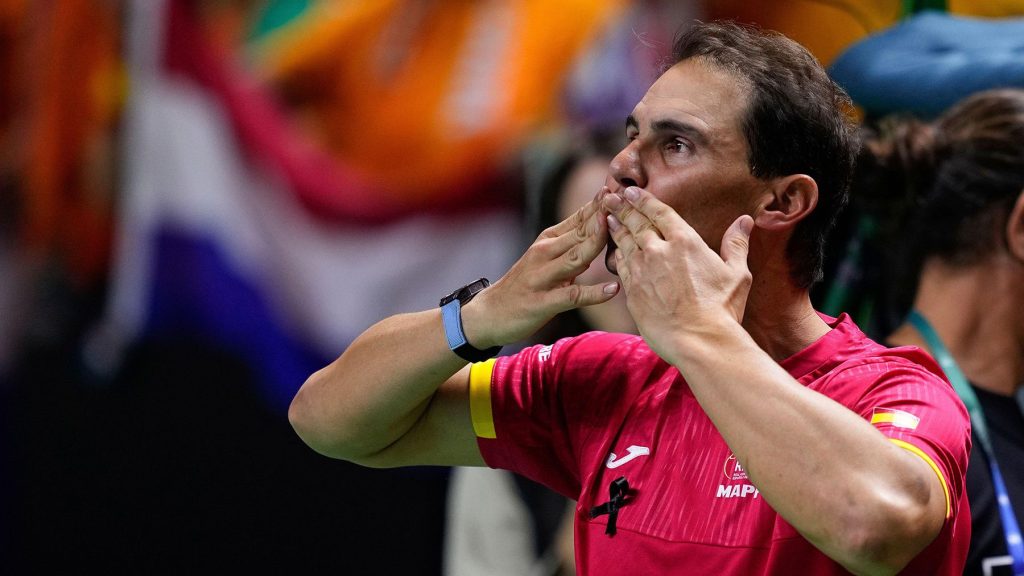
Rafael Nadal
Rafael Nadal bid farewell to professional tennis on Tuesday, surrounded by the support of his peers and fans, marking the end of an illustrious career. With tears in his eyes, Nadal expressed a simple yet profound wish: “I just want to be remembered as a good person and a kid that followed their dreams and achieved more than what I’ve ever dreamed.”
Despite his emotional exit following Spain’s shocking loss to the Netherlands in the Davis Cup, Nadal was at peace with his decision. The 38-year-old’s retirement ceremony was marked by touching tributes from his fellow tennis icons, who celebrated not just his skill, but his spirit. Roger Federer, one of his greatest rivals, shared heartfelt admiration, saying, “It was such a privilege to play with you but especially against you. Congratulations on the most incredible career.” Novak Djokovic, too, praised Nadal’s unmatched tenacity and resilience, calling him a source of inspiration for generations of players. Serena Williams reflected on how Nadal inspired her own career, fueling her drive to improve and persevere.
As Nadal left the court one final time, blowing kisses to the crowd and embracing his Spanish teammates, the significance of his journey became clear—a journey that began in 2001 when he turned professional at just 14 years old. Nadal’s rise through the ranks was swift, with his first ATP Tour win in 2002 in Mallorca, just months before his 16th birthday. He would go on to quickly climb the rankings, reaching No. 49 by 2003 and claiming his first ATP singles title in 2004, followed by his breakout Davis Cup win for Spain.
And that's how we'll always remember you, Rafa#DavisCup #Rafa #GraciasRafa pic.twitter.com/XWEGT35anq
— Davis Cup (@DavisCup) November 19, 2024
But 2005 marked Nadal’s true arrival on the global stage, as he became the first teenager to win a Grand Slam since Pete Sampras in 1990. His historic victory at the French Open that year set the stage for an unparalleled dominance on clay, where Nadal would etch his legacy as the “King of Clay.” By 2005, Nadal won a stunning 24 consecutive matches during the clay season, culminating in his first French Open title—a tournament he would eventually dominate, winning it an astounding 14 times.
Over the years, Nadal’s career became synonymous with the French Open. His resilience on the red clay at Roland Garros was unmatched, with a near-impervious 112-3 record that included only a handful of defeats. Nadal’s intensity, combined with his ability to adjust and evolve his game, made him a formidable force on the court. “On clay, it felt like I was stepping into your backyard,” said Federer, acknowledging the Spaniard’s unrivaled mastery of the surface.
Rafa forever ❤️💛#DavisCup #Rafa #GraciasRafa pic.twitter.com/mX6OL2omzS
— Davis Cup (@DavisCup) November 19, 2024
Nadal’s career was not just defined by his French Open success. His total Grand Slam tally of 22 includes two Australian Open titles, two Wimbledon championships, and four U.S. Open victories. Yet, one of his most iconic moments came at Wimbledon in 2008 when, in a match regarded by many as the greatest ever, Nadal defeated Federer in a historic final. That seven-hour battle in fading light, interrupted by rain delays, ended Federer’s five-year Wimbledon reign and solidified Nadal’s legacy on grass.
In addition to his Grand Slam achievements, Nadal also made history by becoming world No. 1 for the first time in 2008, a position he held for 209 weeks during his career. His career also featured the prestigious career Golden Slam in 2010, when he won all four major titles and Olympic gold. Nadal’s contributions to Spain’s Davis Cup success and his Olympic doubles gold medal in 2016 further underscored his legacy as a great ambassador for the sport.
2017 | La Decima.
Coming back to Paris after having to pull out of the tournament the previous year, Nadal took over and flew by the rounds to lift his 10th Coupe des Mousquetaires. pic.twitter.com/D5civXYrkd
— Roland-Garros (@rolandgarros) November 1, 2024
Despite his many triumphs, Nadal’s career was marred by injuries, which often left fans wondering how many more records he could have broken had his body held up. Yet, it was his resilience in overcoming setbacks that defined him. Even after multiple surgeries and setbacks, Nadal returned to the court time and time again, defying expectations with his fighting spirit. His injuries, though painful, only added to the story of his greatness.
Nadal’s retirement, due to persistent injuries that his 38-year-old body could no longer overcome, marks the end of an era. He leaves the sport as one of its greatest icons, having redefined what it means to compete at the highest level with relentless determination. His legacy, however, goes beyond his trophies and records. It is about his attitude toward the game—his passion, his resilience, and his dedication to improving every day.
Relive the moment Rafael Nadal became a gold medallist at the 2008 Olympic Games! 🥹🥇
Will the King of Clay strike gold once again on the court Philippe-Chatrier? 🥇👀#Paris2024 | #100DaysToGo pic.twitter.com/19k9Z6ezEz
— Eurosport (@eurosport) April 17, 2024
As Nadal exits the tennis stage, his influence on the sport remains indelible. He has inspired countless players, both past and future, and will be remembered not just for his unparalleled achievements but also for his character. “I’ve been able to compete against him a couple of times, get wins over him,” said Alex de Minaur, reflecting on how Nadal’s presence impacted his own career. “All those experiences of sharing the court with him is something I’ll take with me for a very long time.”
For Nadal, the journey from a young boy chasing a dream to one of tennis’ most decorated champions is a story that will echo through the sport for generations to come.







